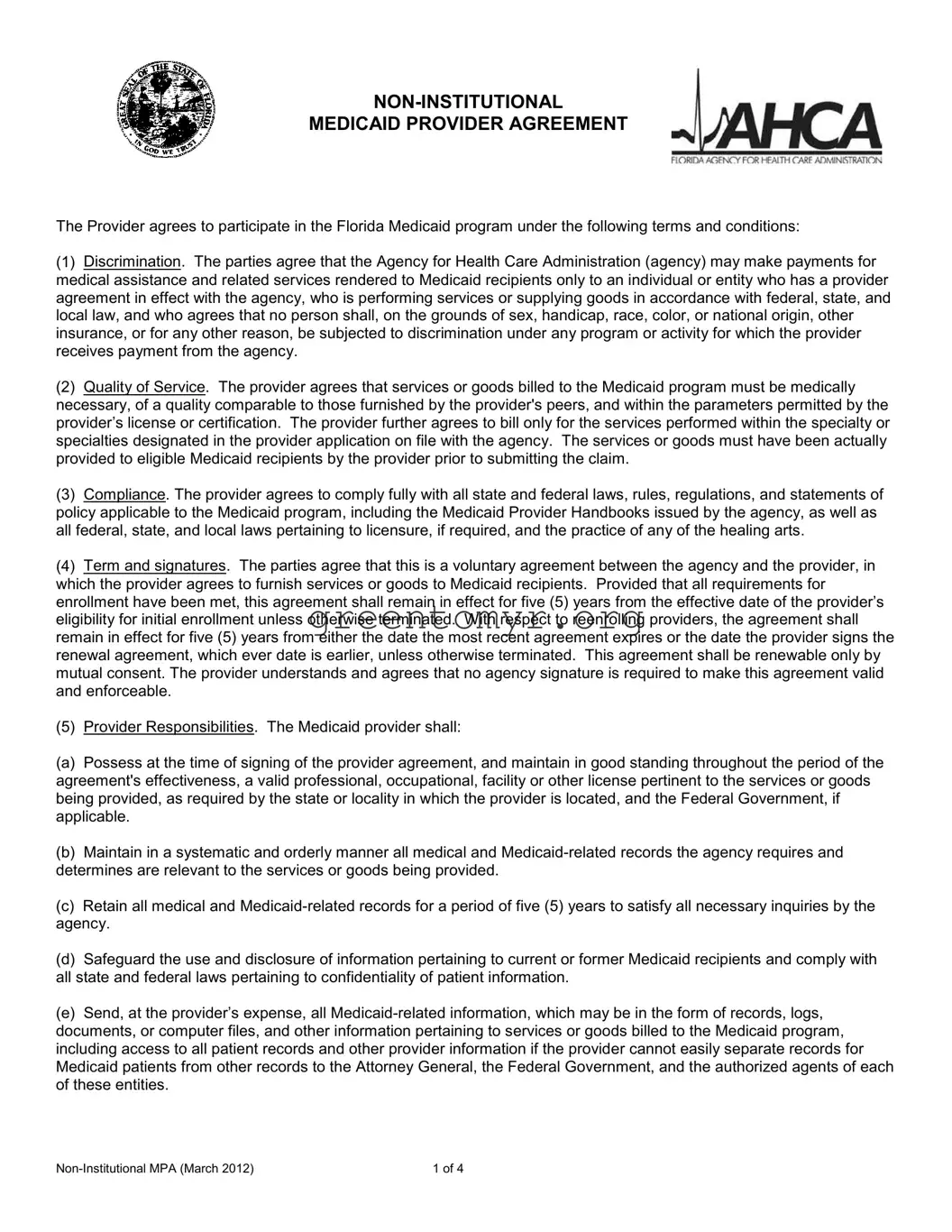(f)Bill other insurers and third parties, including the Medicare program, before billing the Medicaid program, if the recipient is eligible for payment for health care or related services from another insurer or person and comply with all other state and federal requirements in this regard.
(g)Report and refund any moneys received in error or in excess of the amount to which the provider is entitled from the Medicaid program within 90 days of receipt.
(h)Be liable for and indemnify, defend, and hold the agency harmless from all claims, suits, judgments, or damages, including court costs and attorney's fees, arising out of the negligence or omissions of the provider in the course of providing services to a recipient or a person believed to be a recipient to the extent allowed by in and accordance with section 768.28, F.S. (2001), and any successor legislation.
(i)Provide proof of liability insurance at the option of the agency and maintain such insurance in effect for any period during which services of goods are furnished to Medicaid recipients.
(j)Accept Medicaid payment as payment in full, and not bill or collect from the recipient or the recipient's responsible
party any additional amount except, and only to the extent the agency permits or requires, co-payments, coinsurance, or deductibles to be paid by the recipient for the services or goods provided. This includes situations in which the provider’s Medicare coinsurance claims are denied in accordance with Medicaid policy.
(k)Comply with all of the requirements of Section 6032 (Employee Education About False Claims Recovery) of the Deficit Reduction Act of 2005, if the provider receives or earns five million dollars or greater annually under the State plan.
(l)Submit, within 35 days of the date on a request by the Secretary or the Medicaid agency, full and complete information about the ownership of any subcontractor with whom the provider has had business transactions totaling more than $25,000 during the 12-month period ending on the date of the request; and any significant business transactions between the provider and any wholly owned supplier, or between the provider and any subcontractor, during the 5-year period ending on the date of the request.
(m)Employ only individuals who may legally work in the United States, either U.S. citizens or foreign citizens who are authorized to work in the U.S, in compliance with the Immigration Reform and Control Act of 1986 which prohibits employers from knowingly hiring illegal workers.
(n)Utilize the U.S. Department of Homeland Security’s E-Verify Employment Eligibility Verification system to verify the employment eligibility of all persons employed by the provider during the term of this Contract to perform employment duties within Florida and all persons (including subcontractors) assigned by the provider to perform work pursuant to this Contract. The provider shall include this provision in all subcontracts it enters into for the performance of work under this Contract.
(o)Attest that all statements and information furnished by the prospective provider before signing the provider agreement shall be true and complete. The filing of a materially incomplete, misleading or false application will make the application and agreement voidable at the option of the agency and is sufficient cause for immediate termination of the provider from the Medicaid program and/or revocation of the provider number.
(p)Agree to notify the agency of any changes to the information furnished on the Florida Medicaid Provider Enrollment Application including changes of address, tax identification number, group affiliation, depository bank account, and principals. For this purpose, principals includes partners or shareholders of five (5) percent or more, officers, directors, managers, financial records custodian, medical records custodian, subcontractors, and individuals holding signing privileges on the depository account, and other affiliated person.
(q)Agree to notify the agency within 5 business days after suspension or disenrollment from Medicare. Failure to notify may result in sanctions imposed pursuant s. 409.908 (24) and the provider may be required to return funds paid to the provider during the period of time that the provider was suspended or disenrolled as a Medicare provider.
(6)Agency Responsibilities. The agency shall:
(a)Make timely payment at the established rate for services or goods furnished to a recipient by the provider upon receipt of a properly completed claim.


